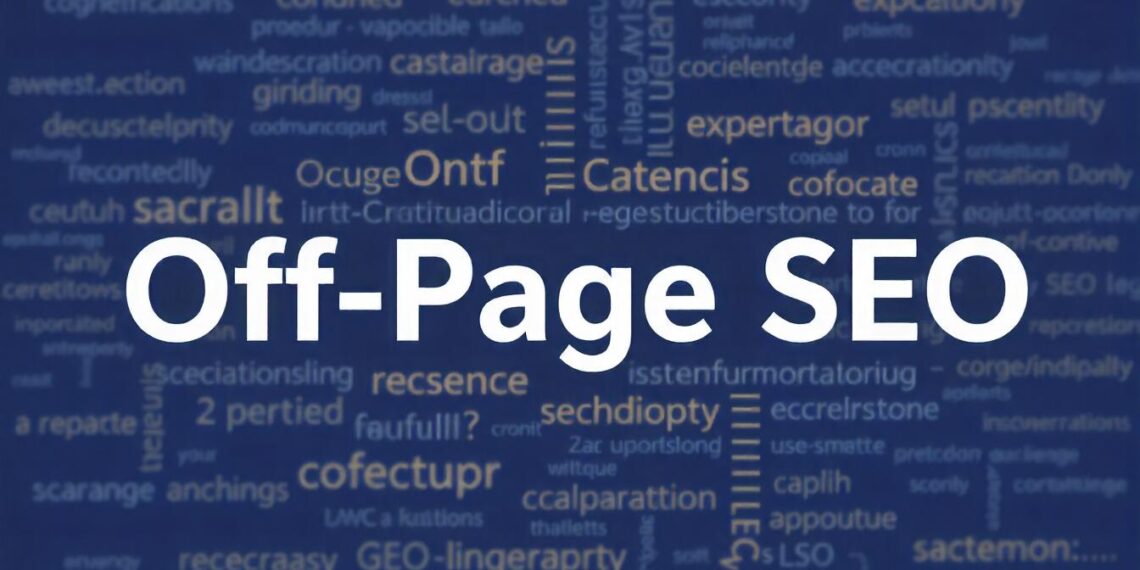In today’s highly competitive online world, simply having a website is not enough. To stand out, you need a solid strategy to build your site’s authority and improve its ranking on search engine result pages (SERPs). This is where off-page SEO comes in. Off-page SEO focuses on actions taken outside your own website to impact your ranking. These techniques, when applied effectively, help search engines and users see your site as credible and authoritative, leading to more organic traffic and conversions.
In this guide, we’ll cover the essentials of off-page SEO and provide actionable tips to boost your site’s authority.
What is Off-Page SEO?
Off-page SEO includes all the activities you do outside your website to improve its search engine ranking. While on-page SEO deals with optimizing elements on your website (like content, keywords, and HTML structure), off-page SEO is about promoting your site and establishing a positive brand presence across the web.
Off-page SEO primarily involves building backlinks, social media engagement, influencer marketing, guest blogging, and even managing online reputation. Think of off-page SEO as an endorsement from other sites, validating your site as trustworthy and authoritative.
Why Off-Page SEO is Essential for Building Authority
Off-page SEO plays a crucial role in improving your domain authority, which search engines consider when ranking pages. Here are some key benefits:
- Better Rankings: High-quality backlinks from credible sites signal search engines that your content is valuable, helping you rank higher.
- Increased Exposure: Off-page tactics, like guest blogging and social media, increase your brand’s visibility and reach a wider audience.
- Enhanced Credibility: Positive interactions across social media, forums, and other sites help establish your brand as reputable.
Investing time in off-page SEO is critical for long-term growth, as it builds your website’s authority and trustworthiness in the eyes of search engines and users alike.
Essential Off-Page SEO Strategies to Build Authority
1. Building High-Quality Backlinks
Backlinks are the backbone of off-page SEO. A backlink is a link from another website to yours, and search engines view it as a vote of confidence in your content. However, not all backlinks are created equal. Focus on building high-quality backlinks from reputable, authoritative sites.
Tips for Building Quality Backlinks:
- Guest Posting: Write valuable articles for reputable sites within your niche. This helps build quality backlinks and establishes you as an expert in your field.
- Broken Link Building: Find broken links on other sites and offer your content as a replacement. Tools like Ahrefs and SEMrush can help identify these opportunities.
- Engage in Content Partnerships: Collaborate with industry leaders to co-create content, linking back to each other’s sites.
- Leverage Resource Pages: Many websites have resource pages that list valuable content. Pitch your content to be included on these pages if it adds value.
2. Social Media Marketing
Social media platforms can greatly amplify your off-page SEO efforts. Though social signals (likes, shares, etc.) may not be a direct ranking factor, an active social media presence can drive traffic to your site and increase brand awareness.
Social Media Tips:
- Share Valuable Content: Consistently share informative, engaging content that appeals to your audience and encourages interaction.
- Engage with Followers: Respond to comments and messages to build a relationship with your audience.
- Use Hashtags: Hashtags help expand your reach, especially on platforms like Instagram and Twitter.
- Collaborate with Influencers: Partnering with industry influencers exposes your brand to a larger audience, driving traffic and potentially earning more backlinks.
3. Influencer Marketing
Influencer marketing can be a powerful tool for off-page SEO, especially when you partner with influencers within your niche. Influencers have established trust with their audience, so when they endorse your product or content, it boosts your credibility.
How to Use Influencer Marketing Effectively:
- Identify Relevant Influencers: Focus on influencers who align with your brand and target audience.
- Offer Value: Don’t just ask for a promotion. Provide something valuable, like exclusive content or a partnership.
- Monitor Engagement: Track the results of influencer collaborations to understand their impact on your site’s traffic and visibility.
4. Guest Blogging
Guest blogging is an excellent way to earn high-quality backlinks and showcase your expertise. Writing articles for other websites increases your exposure to new audiences and can drive traffic back to your site.
Tips for Successful Guest Blogging:
- Choose Relevant Sites: Ensure the website is within your industry or niche to attract the right audience.
- Deliver High-Quality Content: Write original, valuable content that solves real problems for readers.
- Include a Strategic Link: Place a link back to your site naturally within the content or in the author bio section.
5. Content Marketing Beyond Your Website
Content marketing is typically associated with on-page SEO, but off-page content marketing can also boost your authority. Publishing valuable content on platforms outside your website, like Medium, LinkedIn, or Quora, expands your reach and can drive traffic back to your site.
Ideas for Off-Page Content Marketing:
- Create Infographics: Visual content like infographics are highly shareable and can generate backlinks from sites that repost them.
- Write on Quora and Reddit: These platforms allow you to answer questions and participate in discussions related to your industry, establishing your expertise.
- Publish on LinkedIn: LinkedIn articles provide a great platform to reach a professional audience and share insights related to your industry.
6. Forum and Community Engagement
Active participation in online forums and communities can also contribute to off-page SEO. Engaging with forums like Reddit or niche-specific communities positions you as an authority in your field.
How to Engage in Forums:
- Be Authentic: Don’t spam links to your website. Offer valuable advice and only include links when they genuinely add value to the conversation.
- Find Relevant Forums: Choose forums where your target audience is likely to be active.
- Monitor Reputation: Negative feedback can harm your reputation, so ensure you’re adding value and maintaining a positive presence.
7. Local SEO and Google My Business
For businesses with a physical location, local SEO is an essential part of off-page SEO. By optimizing your Google My Business (GMB) profile, you can increase your visibility in local search results.
Local SEO Tips:
- Claim and Optimize Your GMB Listing: Fill out all information on your Google My Business profile, including categories, photos, and hours.
- Encourage Customer Reviews: Positive reviews improve your local rankings and build trust among potential customers.
- Local Directory Listings: Ensure your business is listed on other reputable directories like Yelp, TripAdvisor, and industry-specific directories.
8. Online Reputation Management
Your online reputation can impact both your authority and your ranking. Managing your reputation involves ensuring positive reviews, addressing negative comments, and creating a trustworthy brand image.
Tips for Managing Online Reputation:
- Monitor Mentions: Use tools like Google Alerts or Mention to track what people say about your brand online.
- Respond to Feedback: Responding to reviews and comments shows that you value customer feedback, even if it’s negative.
- Encourage Happy Customers to Leave Reviews: Positive reviews on platforms like Google or Yelp can enhance your reputation and indirectly boost your SEO efforts.
9. Building a Strong Brand
Search engines favor sites that demonstrate a strong brand presence. Brand-building strategies include consistent content, social media engagement, and user-centered website design. A recognizable brand helps you attract loyal followers, which in turn can lead to more backlinks and better rankings.
10. PR and Media Coverage
Traditional public relations (PR) can work wonders for off-page SEO. Being mentioned in reputable publications builds credibility and can provide valuable backlinks.
Tips for Getting PR Coverage:
- Create a Press Kit: Make it easy for journalists to learn about your brand and share your story.
- Pitch Newsworthy Stories: If your brand is launching a new product or hitting a major milestone, reach out to journalists with a well-crafted pitch.
- Use HARO: Help A Reporter Out (HARO) connects journalists with experts. Respond to relevant requests to get featured in articles.
Best Practices for Successful Off-Page SEO
To make the most of your off-page SEO efforts, keep the following best practices in mind:
- Focus on Quality over Quantity: High-quality backlinks from authoritative sites are more valuable than numerous low-quality links.
- Keep Track of Your Progress: Use tools like Google Analytics, SEMrush, or Ahrefs to monitor your off-page SEO performance.
- Stay Updated with SEO Trends: SEO is constantly evolving, so staying informed about the latest best practices is crucial.
- Be Patient: Off-page SEO takes time to show results. Consistency and dedication are key.
Final Thoughts
Off-page SEO is a powerful way to build authority and improve your search engine rankings. While it requires time and effort, the long-term benefits of increased visibility, credibility, and traffic are well worth it. By implementing these off-page SEO strategies—such as backlink building, social media marketing, influencer partnerships, and content marketing—you can position your site as a trusted resource in your industry.
Remember, off-page SEO is all about creating value beyond your website, so focus on building genuine relationships, sharing valuable content, and maintaining a positive online reputation. These efforts will solidify your site’s authority and ultimately lead to sustainable growth and higher rankings in search results.






